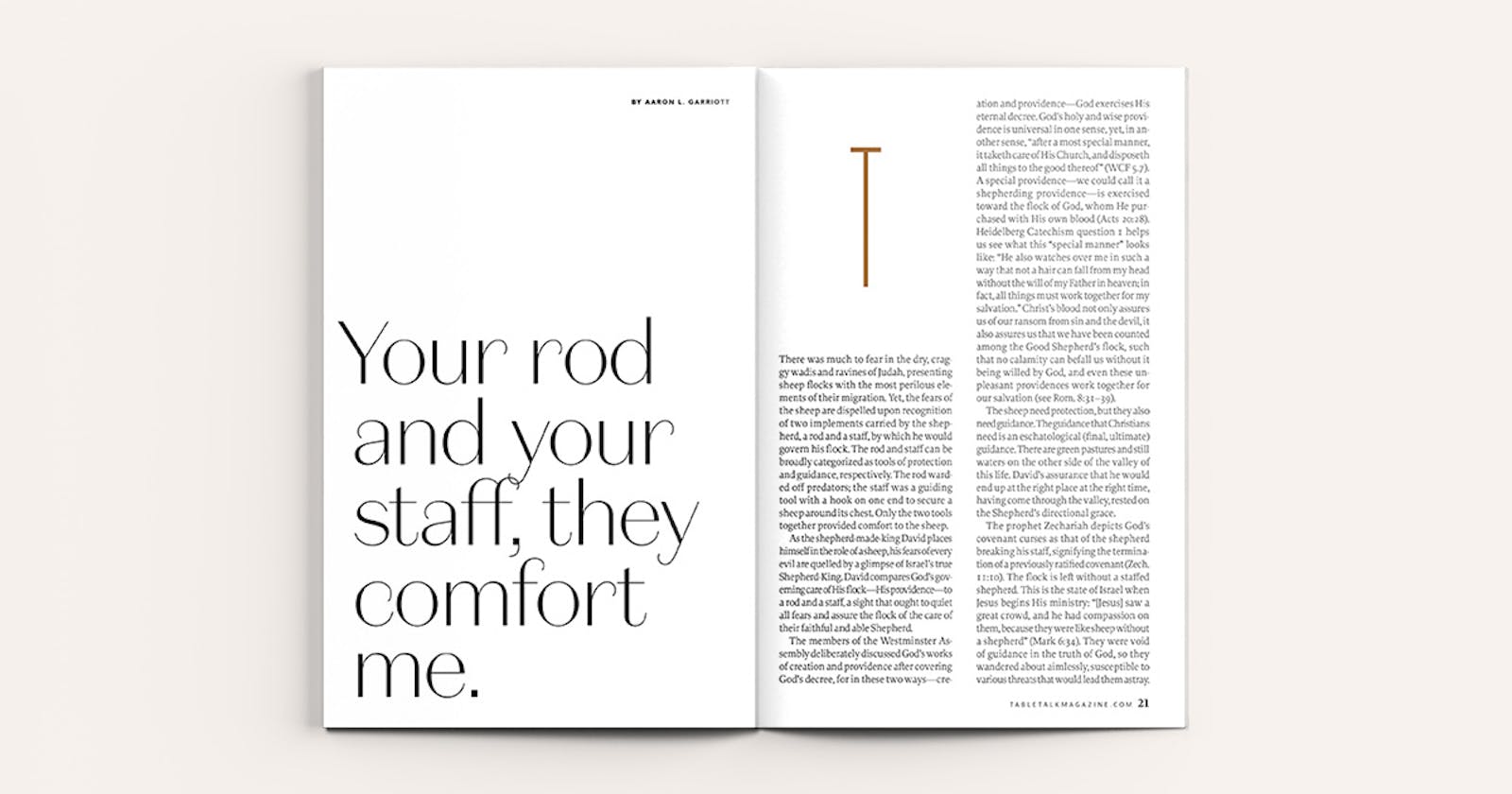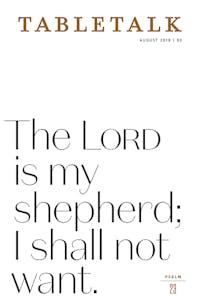
Request your free, three-month trial to Tabletalk magazine. You’ll receive the print issue monthly and gain immediate digital access to decades of archives. This trial is risk-free. No credit card required.
Try Tabletalk NowAlready receive Tabletalk magazine every month?
Verify your email address to gain unlimited access.
There was much to fear in the dry, craggy wadis and ravines of Judah, presenting sheep flocks with the most perilous elements of their migration. Yet, the fears of the sheep are dispelled upon recognition of two implements carried by the shepherd, a rod and a staff, by which he would govern his flock. The rod and staff can be broadly categorized as tools of protection and guidance, respectively. The rod warded off predators; the staff was a guiding tool with a hook on one end to secure a sheep around its chest. Only the two tools together provided comfort to the sheep.
As the shepherd-made-king David places himself in the role of a sheep, his fears of every evil are quelled by a glimpse of Israel’s true Shepherd-King. David compares God’s governing care of His flock—His providence—to a rod and a staff, a sight that ought to quiet all fears and assure the flock of the care of their faithful and able Shepherd.
The members of the Westminster Assembly deliberately discussed God’s works of creation and providence after covering God’s decree, for in these two ways—creation and providence—God exercises His eternal decree. God’s holy and wise providence is universal in one sense, yet, in another sense, “after a most special manner, it taketh care of His Church, and disposeth all things to the good thereof” (WCF 5.7). A special providence—we could call it a shepherding providence—is exercised toward the flock of God, whom He purchased with His own blood (Acts 20:28). Heidelberg Catechism question 1 helps us see what this “special manner” looks like: “He also watches over me in such a way that not a hair can fall from my head without the will of my Father in heaven; in fact, all things must work together for my salvation.” Christ’s blood not only assures us of our ransom from sin and the devil, it also assures us that we have been counted among the Good Shepherd’s flock, such that no calamity can befall us without it being willed by God, and even these unpleasant providences work together for our salvation (see Rom. 8:31–39).
The sheep need protection, but they also need guidance. The guidance that Christians need is an eschatological (final, ultimate) guidance. There are green pastures and still waters on the other side of the valley of this life. David’s assurance that he would end up at the right place at the right time, having come through the valley, rested on the Shepherd’s directional grace.
The prophet Zechariah depicts God’s covenant curses as that of the shepherd breaking his staff, signifying the termination of a previously ratified covenant (Zech. 11:10). The flock is left without a staffed shepherd. This is the state of Israel when Jesus begins His ministry: “[Jesus] saw a great crowd, and he had compassion on them, because they were like sheep without a shepherd” (Mark 6:34). They were void of guidance in the truth of God, so they wandered about aimlessly, susceptible to various threats that would lead them astray.

Nonetheless, the Good Shepherd has come, and He has His staff. That staff means He providentially leads us through the valley by His Word, by His Spirit, and by His undershepherds. First, we have the Word. We’re not left wandering in the dark, but we have the law as “a lamp to [our] feet and a light to [our] path” (Ps. 119:105). Second, we have the Spirit. The Westminster Confession attributes this guidance unto perseverance to “the abiding of the Spirit” and “the seed of God within [us]” (17.2). Third, we have God’s undershepherds—leaders who are bishops of our souls (Heb. 13:17; 1 Peter 2:25). Jesus fulfills the Davidic covenant as the shepherd-king in David’s line (Ezek. 34:23–24), and one of the ways He does so is through church elders—qualified men appointed to function as His undershepherds.
We Christians are pilgrim sheep who haven’t yet reached our eternal rest. Until then, when danger lurks, when temptation prowls, when hardships and adversities are frequent, what will bring us comfort other than the rod and staff of our Shepherd? When hardship befalls us and fear is paralyzing, we rest wholly upon the providence of our Good Shepherd who will protect us and direct us throughout our migration toward the eternal quiet waters and green pastures (Rev. 22:1–2). Of course, the shepherding equipment is effective only insofar as the shepherd is competent and strong. Consider, then, if David’s notice of his Shepherd’s rod and staff assuages his fears, the Shepherd wielding them must be one of sublime strength. Such strength characterizes the Good Shepherd—both David’s Shepherd and ours—whose perfect, holy providence will let not one sheep be snatched from His fold (John 10:28).
